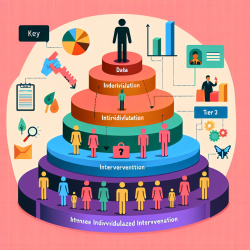In the ever-evolving field of speech-language pathology, practitioners must continually seek data-driven insights to improve their skills and outcomes for children. One such insightful research article is "Psychological Aspects of Self-Government in the Residential Treatment of the Delinquent Child and Adolescent" by Leonard Bloom, published in 1956. This article offers valuable perspectives on how self-government can be an effective component in the treatment of delinquent children and adolescents.
Key Findings from the Research
The study highlights several psychological aspects of self-government that can be particularly beneficial:
- Empowerment through Responsibility: Giving children and adolescents a role in their own governance fosters a sense of responsibility and accountability.
- Improved Self-Esteem: Participation in self-governance activities has been shown to improve self-esteem and confidence.
- Enhanced Social Skills: The collaborative nature of self-government helps improve social interaction and communication skills.
- Behavioral Improvements: Children involved in self-governance are more likely to exhibit positive behavioral changes.
Practical Applications for Practitioners
Practitioners working with delinquent children and adolescents can incorporate these findings into their therapy sessions to enhance outcomes. Here are some practical steps:
1. Create a Structured Environment
Establish a structured environment where children can participate in decision-making processes. This can include setting rules, planning activities, and discussing consequences.
2. Encourage Group Activities
Facilitate group activities that require collaboration and decision-making. This not only helps in developing social skills but also in fostering a sense of community and belonging.
3. Monitor and Guide
While self-government emphasizes autonomy, it is crucial to provide guidance and support. Monitor the progress and provide feedback to help children stay on track.
4. Foster Accountability
Encourage children to take responsibility for their actions. This can be done through regular meetings where they can discuss their progress and challenges.
Encouraging Further Research
While the findings from this study are promising, it is essential for practitioners to stay updated with the latest research. Engaging in further research can provide more nuanced insights and help tailor interventions to individual needs.
Why Further Research is Important
- Adaptation to Modern Contexts: The study was conducted in 1956, and while the core principles remain relevant, contemporary research can adapt these principles to modern contexts.
- Individual Differences: Further research can help understand how individual differences affect the outcomes of self-government interventions.
- Technological Integration: Exploring how technology can be integrated into self-government practices can offer new avenues for engagement and monitoring.
Conclusion
Incorporating the principles of self-government into the treatment of delinquent children and adolescents can lead to significant improvements in their psychological and behavioral outcomes. Practitioners are encouraged to apply these insights in their practice and engage in further research to continue improving their skills and outcomes.To read the original research paper, please follow this link:
Psychological Aspects of Self-Government in the Residential Treatment of the Delinquent Child and Adolescent.










